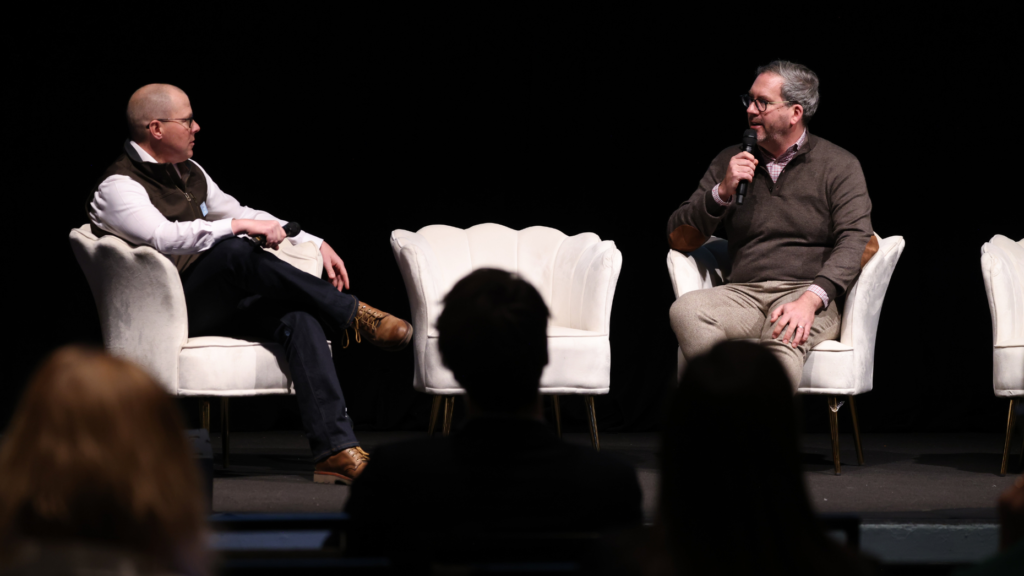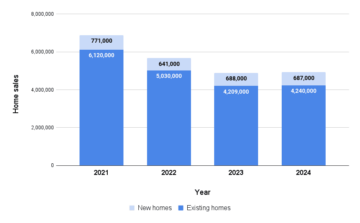
In these times, it’s time to double down — on your skills, on your knowledge — on you. Join us August 8-10 at Inman Connect Las Vegas to lean into the shift and learn from the best. Get your ticket now for the best price.
Although Clément Delpirou is relatively unknown in the United States, he’s one of the most influential real estate leaders in France with his brokerage, iad Group, taking the spot as Europe’s largest virtual brokerage with more than 20,000 agents across 66 countries.
“Thank you first for having me here today because you know [Inman] Connect is kind of the holy grail for an old-world proptech guy like me, ” he said humbly to the Broker Connect Crowd in his “What We Can Learn From International Real Estate Markets and Their Business Models” session on Tuesday. “I would probably describe [iad Group] as a teenager since the company has been established 15 years ago.”
“It has grown from zero to 20,000 agents right now via its networking model, [and it’s] Europe’s largest digital brokerage with more than 20,000 agents in 66 countries. [We’re] quite strong also in Mexico and [we’re] now trying the U.S. challenge.”
As he plans an entrance into the U.S. market, Delpirou said there are plenty of similarities between the challenges European and American real estate companies are facing — the choice between virtual and brick-and-mortar offices, building efficient tech stacks with high adoption rates and driving robust recruitment and retention rates among agents all while navigating global macroeconomic troubles.
“We don’t have any physical branches, so we need to replace almost every aspect of what an office could break within our tech network and a lot more,” he said. “But for the rest, it’s a lot about lead generation, not only buyers and sellers of course but also agents leads since technology today brings us a fair share of 40 percent of new agents.”
Delpirou said a robust tech stack is still the main selling point with agents, as newbies lean on iad Group’s virtual university to continue their training, and more experienced agents leverage iad’s systems to save time on admin tasks.
“Removing as much as we can admin tasks and saving them a lot of time is absolutely a key issue for us on a day-to-day basis,” he said.
When it comes to issues with driving tech adoption, Delpirou said that’s a relatively new issue for French brokers since agents were formerly classified as employees.
“In the history of [the] European model of real estate, believe it or not, agents were formerly employees at that time. It was very simple. You could tell them, ‘Do that,’” he said. “But we cannot force them anymore.”
The CEO didn’t share specific adoption rates, but he said iad Group agents tend to embrace brokerage technology since it enables them to build a hearty referral pipeline with agents across the world.
“We built the company as a very international network, which means that you can build your network for less and have networks in all our 66 countries,” he said. “And the fact that your peers in other [markets] need to work with you… on the sales front with the same tool is a good enticement because it helps build their revenue path.”
Delpriou said another similarity between the U.S. and Europe is the challenge of improving valuation tools and providing real-time market updates that help agents and their clients make smart decisions fast.
“Probably a lot of potential improvement is around listing presentations and valuations because they’re those related to one of the key objectives [and] pain points of the relationship with our end client, which is trust and transparency,” he said. “We’ve seen that valuation tools have made a lot of progress in recent years, but there’s still a lot to do so it’s not the kind of tool that will just generate a price or an assessment for the client.”
Like in the U.S., Delpriou said French real estate professionals are carefully leaning into artificial intelligence and other automated tools to give them more time to embrace their roles as advisers, instead of simply being glorified transaction coordinators.
“We’re on the almost consulting path where you can recommend certain pricing or even a fast sale and short price if you’re not able to deal with a slower sale,” he said. “So and with the use of AI [and other tools] we’re able to get great pictures and write great texts… We have the ability to enhance our level of quality in both these aspects.”
Another shared challenge comes with commissions, Delpriou said. While U.S. agents await the federal courts’ decision on buyer-broker agreements and a potential change in who pays agents for their work, the CEO said European agents are focusing on getting higher commissions.
“A six percent commission… I would say that you guys are so lucky,” he said. “That’s probably a blessing for brokers and agents here to be able to work on a proper commission basis. If you take the U.K. for example with a 1.15 percent commission, that means both agents and their clients are unhappy with the market.
“So I think that [six percent commission] is something that for European people is very impressive,” he added.
Lastly, Delpriou said European agents are dealing with similar macroeconomic pressures as the global market feverishly fends off the risk of a recession and are also making a number of strategic shifts to survive whatever 2023 may bring.
“It’s so many people telling me the market is bearish,” he said. “But we’re going to be warriors. We’re going to be fearless [and] we’re going to be in the battle to make a better market.”
“It’s also true that maybe European agents had some time to be a bit more rational and there was a bit more of doubt,” he added. “But being here for a few days is always a breath of fresh air and this is something very, very positive.”
- SEO Powered Content & PR Distribution. Get Amplified Today.
- Platoblockchain. Web3 Metaverse Intelligence. Knowledge Amplified. Access Here.
- Source: https://www.inman.com/2023/01/24/french-ceo-celebrates-similarities-differences-in-us-market/
- 000
- 1
- 15 years
- 2023
- a
- ability
- Able
- About
- absolutely
- across
- added
- admin
- Adoption
- agents
- agreements
- AI
- AIR
- All
- always
- American
- among
- and
- Another
- around
- artificial
- artificial intelligence
- aspect
- aspects
- assessment
- AUGUST
- Automated
- await
- basis
- Battle
- bearish
- because
- being
- believe
- BEST
- Better
- between
- Bit
- branches
- Break
- Breath
- bring
- Brings
- broker
- brokerage
- brokers
- build
- Building
- built
- business
- buyers
- cannot
- carefully
- celebrates
- ceo
- certain
- challenge
- challenges
- change
- choice
- classified
- client
- clients
- COM
- commission
- commissions
- Companies
- company
- Connect
- consulting
- continue
- could
- countries
- course
- crowd
- Days
- deal
- dealing
- decision
- decisions
- describe
- differences
- digital
- Dont
- double
- doubt
- down
- driving
- efficient
- embrace
- employees
- enables
- established
- estate
- Europe
- European
- Europes
- Even
- Every
- example
- experienced
- facing
- fair
- FAST
- Federal
- few
- First
- focusing
- Force
- formerly
- France
- French
- fresh
- from
- front
- generate
- generation
- get
- getting
- Give
- Global
- global market
- going
- good
- Grail
- great
- Group
- Group’s
- grown
- Guy
- having
- help
- helps
- here
- High
- higher
- history
- HTTPS
- impressive
- improvement
- improving
- in
- In other
- Influential
- instead
- Intelligence
- International
- issue
- issues
- IT
- join
- Join us
- Key
- Kind
- Know
- knowledge
- largest
- Las Vegas
- lead
- leaders
- Leads
- LEARN
- Level
- Leverage
- listing
- Lot
- Macroeconomic
- made
- Main
- make
- Making
- many
- many people
- Market
- Market Updates
- Markets
- means
- Mexico
- model
- more
- most
- navigating
- Need
- network
- networking
- networks
- New
- number
- objectives
- Office
- offices
- ONE
- Other
- Pain
- Pain points
- path
- pays
- People
- percent
- physical
- Pictures
- pipeline
- plans
- plato
- Plato Data Intelligence
- PlatoData
- Plenty
- Point
- points
- positive
- potential
- Presentations
- price
- pricing
- probably
- professionals
- Progress
- proper
- PropTech
- providing
- quality
- Rates
- Rational
- real
- real estate
- real estate markets
- real-time
- recent
- recession
- recommend
- recruitment
- Referral
- related
- relationship
- relatively
- replace
- REST
- retention
- revenue
- Risk
- robust
- roles
- Said
- sale
- sales
- same
- Save
- saving
- Sellers
- Selling
- selling point
- session
- Share
- shared
- shift
- Shifts
- Short
- similar
- similarities
- Simple
- simply
- since
- SIX
- skills
- smart
- So
- some
- something
- specific
- Spot
- stack
- Stacks
- States
- Still
- Strategic
- strong
- survive
- Systems
- Take
- taking
- tasks
- tech
- Technology
- teenager
- The
- the world
- their
- ticket
- time
- times
- to
- today
- tool
- tools
- Training
- transaction
- Transparency
- true
- Trust
- Tuesday
- U.K.
- u.s.
- United
- United States
- university
- Updates
- us
- use
- Valuation
- Valuations
- VEGAS
- via
- Virtual
- Warriors
- What
- which
- while
- WHO
- will
- within
- Work
- world
- would
- write
- years
- Your
- zephyrnet
- zero












